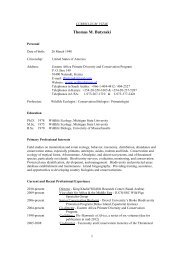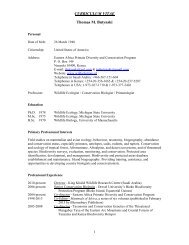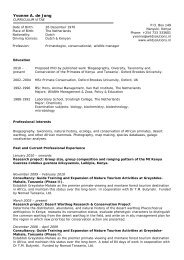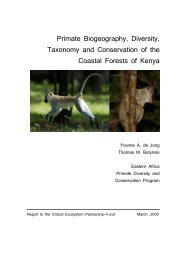Zanzibar red colobus on Pemba Island, Tanzania - Wild Solutions
Zanzibar red colobus on Pemba Island, Tanzania - Wild Solutions
Zanzibar red colobus on Pemba Island, Tanzania - Wild Solutions
Create successful ePaper yourself
Turn your PDF publications into a flip-book with our unique Google optimized e-Paper software.
Mammals<br />
populati<strong>on</strong> comprised c. 60 animals. This is a 67% increase during the 13 - 17<br />
years post-introducti<strong>on</strong> (Struhsaker & Siex, 1998). This populati<strong>on</strong> was still<br />
present in April 2011 (T. Butynski & Y. de J<strong>on</strong>g, pers. obs.).<br />
Suitable capture method exists: The method for capturing and translocating P.<br />
kirkii, as described by Silkiluwasha (1981) for the 1977 - 1978 translocati<strong>on</strong>s<br />
within <str<strong>on</strong>g>Zanzibar</str<strong>on</strong>g>, is effective, inexpensive, and mortality is low at about 10% (4<br />
of 40 captu<str<strong>on</strong>g>red</str<strong>on</strong>g> animals died). Whether mortality was similar for the Ngezi<br />
Forest introducti<strong>on</strong> is not known but might have been higher given the greater<br />
distance (c. 150 km) between the capture site and the release site.<br />
L<strong>on</strong>g-term m<strong>on</strong>itoring scheme is requi<str<strong>on</strong>g>red</str<strong>on</strong>g>: Without a good post-release<br />
m<strong>on</strong>itoring program in place, the opportunity to obtain informati<strong>on</strong> useful to<br />
improving the introducti<strong>on</strong> process and post-introducti<strong>on</strong> management of the<br />
populati<strong>on</strong>, and of assessing the impact of the introduced populati<strong>on</strong> <strong>on</strong> the<br />
ecosystem, is lost. A l<strong>on</strong>g-term m<strong>on</strong>itoring scheme needs to be put into place.<br />
Enhance benefits to local people: More benefits to local people through ecotourism<br />
in Ngezi Forest, perhaps with a focus <strong>on</strong> viewing P. kirkii, should bring<br />
additi<strong>on</strong>al c<strong>on</strong>servati<strong>on</strong> support from the local community and foster a sense of<br />
pride and resp<strong>on</strong>sibility for the c<strong>on</strong>servati<strong>on</strong> of Ngezi Forest, its biodiversity,<br />
and its populati<strong>on</strong> of P. kirkii.<br />
Success of project<br />
Highly Successful Successful Partially Successful Failure<br />
<br />
Reas<strong>on</strong>(s) for success/failure:<br />
The introduced P. kirkii were placed into what is probably a food-rich habitat;<br />
Ngezi Forest is larger and far more botanically-rich than any forest <strong>on</strong><br />
<str<strong>on</strong>g>Zanzibar</str<strong>on</strong>g>. The altitude and climate (including rainfall) are similar <strong>on</strong> <strong>Pemba</strong> and<br />
<str<strong>on</strong>g>Zanzibar</str<strong>on</strong>g>.<br />
There are <strong>on</strong>ly two species of primate indigenous to <strong>Pemba</strong> and neither is a<br />
competitor with P. kirkii; <strong>Pemba</strong> vervet m<strong>on</strong>key (Cercopithecus pygerythrus<br />
nesiotes) and <str<strong>on</strong>g>Zanzibar</str<strong>on</strong>g> small-ea<str<strong>on</strong>g>red</str<strong>on</strong>g> galago (Otolemur garnettii garnettii).<br />
There are no significant n<strong>on</strong>-human p<str<strong>on</strong>g>red</str<strong>on</strong>g>ators of m<strong>on</strong>keys <strong>on</strong> <strong>Pemba</strong>, such as<br />
African crowned eagle (Stephanoaetus cor<strong>on</strong>atus), robust chimpanzee (Pan<br />
troglodytes), leopard (Panthera pardus), or central African rock pyth<strong>on</strong> (Pyth<strong>on</strong><br />
sebae).<br />
Pro<str<strong>on</strong>g>colobus</str<strong>on</strong>g> kirkii is not known to be a serious pest of crops and the hunting of<br />
m<strong>on</strong>keys for bushmeat is not an important part of the culture of the people of<br />
<strong>Pemba</strong>, the vast majority of whom are Muslim (Muslims typically do not eat<br />
m<strong>on</strong>keys).<br />
There seems to be a steady increase in the local, nati<strong>on</strong>al and internati<strong>on</strong>al<br />
commitment to the c<strong>on</strong>servati<strong>on</strong> of Ngezi Forest and P. kirkii. Forestry<br />
Department, with support from outside agencies (e.g., CARE, FINNIDA) has<br />
c<strong>on</strong>tinued to improve the protecti<strong>on</strong> and management of Ngezi Forest.<br />
173






